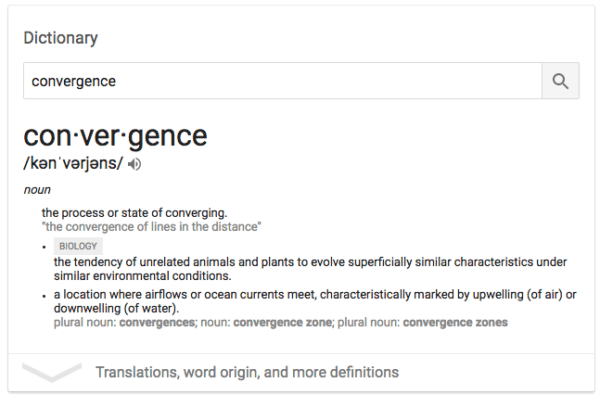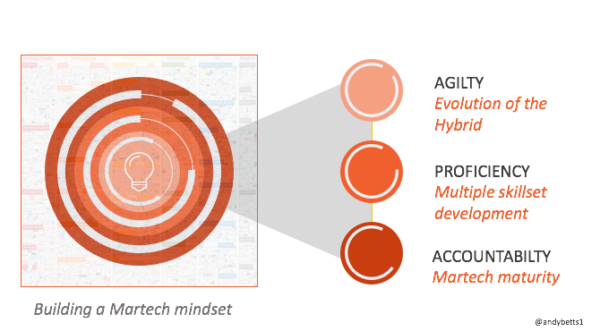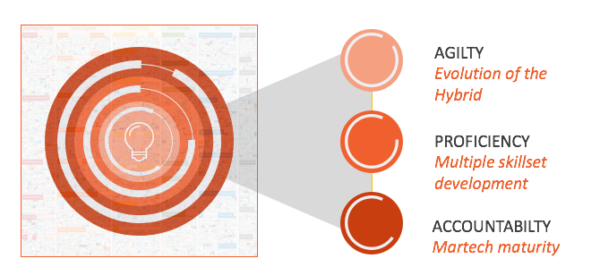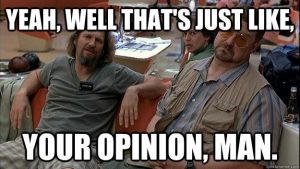In the fast-growing martech space, how do you become a marketing technology mastermind? Contributor Andy Betts takes a look at the skills you need to win in this ever-evolving landscape.

The evolution of Scott Brinker’s iconic Marketing Technology Landscape graphic since 2015 tells the tale of an industry rapidly evolving and bursting at the seams. That was the year the number of martech companies doubled year over year to nearly 2,000 vendors, all the way from just 150 when he began illustrating the proliferation of martech solutions back in 2011. Last year it became a “supergraphic,” itemizing close to 4,000 martech vendors across categories like Advertising & Promotion, Content & Experience, Social & Relationship and more.
Today, it’s ballooned into the “Martech 5000,” comprising 44.2 percent private companies, 48.8 percent investor-backed startups and 6.9 percent enterprises (defined as having at least 1,000 employees or being publicly owned).
In fact, the monster that is martech has the potential to swallow ad tech whole. In this post, we’ll have a look at the current state of martech and what you need to become a mastermind in this exciting, rapidly growing space.
The convergence of ad tech into martech
Sure, ad tech came first, but the automated buying and selling of display, mobile and video ads is, at its core, just a function of marketing. Publishers had a need to sell inventory and advertisers needed to buy; advertising technology permitted these activities in an efficient and accountable way.
Martech has always been about more than the automation of a market, though. Born out of CRM (customer relationship management) systems like Salesforce, martech has empowered marketing and sales teams with tools for lead nurturing, contact management, attribution and analytics, customer support and more.
While ad tech helps brands complete a task, martech is all about achieving specific business outcomes. In a sense, this convergence of ad tech and martech we keep hearing about better fits the biological definition of the word than the physical one:

The technology that empowered automated ad buys evolved first, but ad tech’s success combined with “environmental” conditions gave rise to tools across other facets of marketing, as well. Decreasing investments in ad tech in favor of martech makes sense in this context; for a while, ad tech was the only game in town. Now, technology can empower smarter email marketing, search and social advertising, retail and proximity marketing and more.
It makes sense that companies are diversifying spend as their marketing campaigns become more comprehensive, and investors are following suit.
What the rise of martech means for organizations
Marketing budgets now comprise 11 percent of total company budgets on average, up slightly from 10.4 percent in February 2012, according to Deloitte’s The CMO Survey. However, the way those budgets are spent has changed dramatically.
Laura McLellan at Gartner predicted early in 2012 that in five years, the CMO would be spending more on IT than the CIO, a claim considered outrageous by many. Late in 2016, Gartner confirmed that indeed, CMOs allocated 3.24 percent of revenue to technology spending, which is very close to the 3.4 percent of revenue CIOs earmark for IT.
Today, marketing technology represents 33 percent of the marketing budget, while 28 percent of that martech spend goes toward infrastructure (e.g., servers, storage, network) to run marketing software.
In the aforementioned Deloitte study, researchers also found that companies using marketing analytics in corporate decision-making tended to invest more in marketing as a whole. An examination of three groups — high, medium and low analytics usage rates — found that marketing budgets were 70 percent bigger in the high group (14.8 percent of total budgets) compared with the low group (at 8.7 percent).
Gartner’s Jake Sorofman said last year:
Marketing technology, once a relatively narrow and specialized adjunct to enterprise IT, is now garnering investment nearly equivalent to the core systems that run the business.
I’d go so far as to suggest that right now, marketing is a core system of the business, in progressive organizations.
Becoming a martech mastermind

Of course, companies need people to power the machines; that hasn’t changed. Becoming a martech mastermind requires more than a proficiency with the technology, though. Yes, it’s a combination of technical skill and creativity, but it’s so much more than that.
Back in 2013, Paul Roetzer introduced to us the concept of the prototype or hybrid marketer, who would be “able to perform strategically across multiple disciplines — data analysis, content marketing, social media, email marketing, mobile, development and programming, etc.” Further, he told Phil Simon on HuffPost, “They will also have strong competencies in business, IT and human behavior.”
I’m fond of this more recent definition as well. LinkedIn Global Content Marketing Leader Jason Miller defines a hybrid marketer as a person who:
- sees it as part of their role to learn any new, emerging skill that might have relevance to achieving their objectives.
- doesn’t leave executional knowledge to others — but is wired to seek continually to acquire it.
- doesn’t stick to one [specialty] but seeks to acquire a working knowledge of any that might be relevant.
Both definitions demonstrate the need for agility — to move seamlessly from the creativity of social interaction and content creation to the science of conversion optimization and data analytics, for example.
This requires programming knowledge on the part of marketers, and they’ve made efforts to get up to speed. In a recent survey by ChiefMartec.com and Third Door Media, the publisher of this site, where over 600 participants identified as marketers, 71.5 percent had done computer programming at some point in their lives.
Marketers are taking a more data-driven, scientific approach to their work, too. ChiefMartec.com also found that “most marketers have clearly embraced experimentation as an integral part of their work, with an overwhelming 93.7 percent reporting that they explicitly run experiments on at least a few of their marketing activities.” However, only 39.4 percent strictly follow the scientific method (observations, hypotheses, testing predictions and gathering relevant data to support or refute those hypotheses).
What we’re seeing is that the majority of marketers already have some proficiency with data and technology. However, this doesn’t mean you have to be an expert in every technology available. Rather, hybrid marketers and martech masterminds go further, by honing their abilities to interpret and activate data.
These are the marketing skills, according to LinkedIn, where the greatest gap currently exists between supply and demand. They’re the areas of expertise that marketing departments are desperately searching for, but find it difficult to fulfill:
- Site Maps
- Multivariate Testing
- Omniture
- DoubleClick
- Advertising Operations
- Rich Media
- Behavioral Targeting
- Ad Serving
- Demand Generation
- Ad Networks
- Marketing Automation
Ad serving, ad networks, behavioral targeting, demand gen, marketing automation, multivariate testing… these are all skills encompassed by a single martech mastermind. They could be viewed as functions powered by technology; companies don’t need marketers to manually complete any of these tasks.
Brands need people who understand the underlying technologies and are able to define which creative is needed within each. They need people who are creative, yet demonstrate the analytical acumen to make business and marketing decisions backed by data. The data will hold you accountable for those decisions; there’s no room for faking it until you make it on this new playing field.
This concept of hybrid marketing — of generalists of all marketing trades taking the place of specialists as martech tools perform an increasingly wide array of marketing functions — isn’t new. But it’s the way forward, and could leave many specialists behind in its wake.
Some opinions expressed in this article may be those of a guest author and not necessarily Marketing Land. Staff authors are listed here.
Marketing Land – Internet Marketing News, Strategies & Tips
(100)









